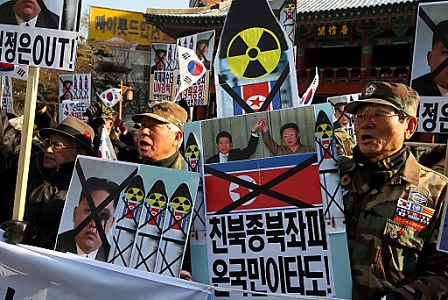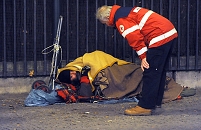Erstellt am: 12. 12. 2012 - 14:38 Uhr
Why nobody stops the North Korean nonsense
Subscribe to the Reality Check podcast and get the whole programme after the show.
North Korea is at it again. After the dramatic failure of a rocket launch back in April, when the rocket disintegrated shortly after take-off and plopped harmlessly into the sea in front of hundreds of invited members of the world's media, Kim Jong Un and his cronies have succeeded in getting a satellite into orbit.
As usual, the world is condemning the launch, and as usual, North Korea is defending its right to launch satellites. I can't help being reminded of the Iranian argument, when they say they have the right to nuclear energy - it's the same technology as can be used for weapons. The North Korean rocket could carry a satellite or a warhead; the point, the rest of the world says, is that North Korea shouldn't be launching rockets at all - it should be worrying about its own people.

EPA/JHK UW
However, despite all the tut-tutting and indignant posturing by North Korea's neighbours and almost everyone else, according to analyst Aidan Foster-Carter, no one is likely to do anything about it. The main reason is "better the devil you know". Much as many people may like the idea of a North Korean regime free world, the ides of toppling that regime is terrifying. It would create millions of refugees, a humanitarian catastrophe, and open up a nuclear arms cache that is of unknown size and scope.
China has decided to support North Korea, but while it might be embarrassed by the regime's antics, it, too, may prefer the status quo. A re-united Korea would bring the US friendly South Korea, along with its thousands of US troops - right to China's doorstep. North Korea may also serve Chinese interests the way it is.
All that put together means that nothing is likely to change in the foreseeable future. North Korea is the country everybody loves to hate, and strategically, it all works out fine. That is not much comfort for the North Korean people, however.
Dieses Element ist nicht mehr verfügbar
Chavez health questions
Cuban doctors say that the operation on Venezuelan President Huge Chavez to remove cancerous tissue was successful, but there are ever bigger questions over the state of his health. Last week, Chavez named his preferred successor. Kevin Middlebrook from the Institute of the Americas in London looks at the implications for Venezuela.
Dieses Element ist nicht mehr verfügbar
Syria recognition
Both the United States and the Friends of Syria have recognised the Syrian National Coalition as the official representation of the Syrian people. Shashank Joshi explains the significance of this move.
Dieses Element ist nicht mehr verfügbar
Salzburg scandal
Political analyst, Annelise Rohrer, gives her analysis of the Salzburg financial scandal.
Dieses Element ist nicht mehr verfügbar
Homelessness in Austria

DPA/gam kno
As temperatures fall, the situation for the homeless becomes more and more difficult.
Klaus Schwertner of Caritas describes how the organisation is coping in Vienna, and explains the role of the Kältetelefon - 01 480 45 53 .
Anyone can use the 24 hour hotline to report when they see homeless people needing assistance, or to offer donations or practical help.
Dieses Element ist nicht mehr verfügbar
FM4 Reality Check
Monday to Friday from 12.00 to 14.00, and after the show via Podcast or fm4.orf.at/realitycheck.


